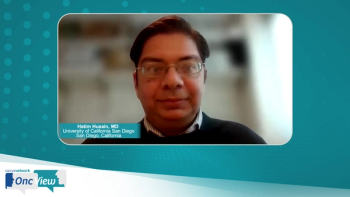
Tazemetostat for Relapsed/Refractory Follicular Lymphoma
Sameh Gaballa, MD, discusses molecular testing in the third-line setting and beyond, as well as the mechanism of action of tazemetostat in the treatment of relapsed/refractory follicular lymphoma.
Episodes in this series

Kristie L. Kahl: How important is molecular testing in treatment for the third-line setting and beyond? In particular, could you talk about EZH2?
Sameh Gaballa, MD: Yeah, this is what I was alluding to. If you look at the phase 2 trial with tazemetostat that was published, there were 2 cohorts. It was not a randomized study. The 2 cohorts were not evenly balanced in terms of disease characteristics. Those who had an EZH2 mutation had very good overall responses. About 70% or so of patients had an overall response, and if you look at the waterfall plots, more than 90% of patients had a reduction in their tumor volume. If you know that this patient has an EZH2 mutation, tazemetostat makes a lot of sense in the third line and beyond because you know you’re going to get very good response that’s probably better than some of the PI3-kinase inhibitors in this space. However, if it’s wild type, then you have to evaluate everything and all the options. Broadly speaking, overall, progression-free survival with the PI3-kinase inhibitors is typically less than a year, so it’s between 9 and 11 months, somewhere in that neighborhood. The overall responses are about 50% to 60%, give or take, depending on which PI3-kinase you’re looking at. Whereas, if you’re looking at EZH2 wild type, the overall response from the study was about 30% of patients.
It seems lower than the PI3-kinases in those settings, but you have to look at all the factors. If you have someone who had comorbidities, is an older patient, someone that may have liver or lung issues, or does what you don’t want them to do, then they’re not going to do well if they get any hepatitis, colitis, or pneumonitis. Based on those things, you may consider a less efficacious treatment if the safety profile is important. It really depends on what the comorbidities are and what your goals are.
Kristie L. Kahl: Dr Gaballa, could you discuss the mechanism of action of the agent in this setting?
Sameh Gaballa, MD: Tazemetostat is an EZH2 inhibitor. It’s an epigenetic modifier. It promotes differentiation of the cells. In follicular lymphoma, you’re going to have cells that are stuck in the germinal center where they are not differentiating anymore to become memory B cells or plasma cells later on.
Under normal physiologic conditions, there’s basically 2 forces you should think about: things that promote differentiation and moving on for B cells, basically promoting transcription, and mechanisms that are driven mainly by EZH2, which inhibit transcription. They clump your DNA, and B cells do not differentiate. So if you have an EZH2 inhibitor, and there’s an EZH2 mutation that is driving this process, then you’re hitting the target with the tazemetostat, which would be very effective in this setting. However, tazemetostat can also work in patients with valid EZH2 mutation, because as I mentioned, there are 2 things here. You could have a driver mutation and the EZH2 is stopping differentiation. On the flip side, there are other mechanisms that would normally promote transcription and could have a loss of function. So you could have the same effect of transcription basically being stopped. Without an EZH2 mutation in this setting, the tazemetostat would work. I don’t want to confuse you, but the bottom line is that it’s a differentiating agent, and it promotes cell differentiation to move from the germinal center onward. If there’s an EZH2 mutation, that’s the driver mutation that’s hitting it. If not, there are other mutations that lead to over expression of EZH2. Without an EZH2 mutation in those patients, the metastatic would still be very effective as well.
Transcript edited for clarity.
Newsletter
Stay up to date on recent advances in the multidisciplinary approach to cancer.


































